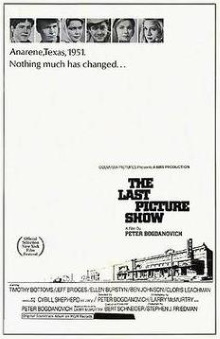
Peter Bogdanovich is another director I’ve never seen anything from before. Associated with Orson Welles, he was heavily featured in They’ll Love Me When I’m Dead. The film was also the debut of Cybill Shepherd. It was filmed in black and white, an unusual decision for the time apparently made after discussing it with Welles. Indeed the whole film, set as it is in the 1950s, feels like it belongs in a different era and right off of the pages of a novel.
Sonny and Duane are best friends who grow up together in a small, nondescript town in Texas and share an old pickup truck. Duane is dating Jacy, the rich and prettiest girl in town while Sonny has grown bored of the girl he has been dating as she refuses to have sex with him. Jacy’s mother dissuades her from getting serious with Duane however, leading her to becoming more interested in a bunch of rich kids from the nearby city of Wichita Falls. Meanwhile Sonny becomes involved with the middle-aged wife of the school football coach who is feeling neglected by her husband. Other notable characters in town include Sam the Lion, a respected man who owns the local pool hall, movie theatre and diner, and Billy, a mentally disabled boy who often hangs out with them. After they graduate and grow older, the town increasingly feels too small for them.
This is part coming-of-age film, part a portrait of life in a small American town. There’s no real central plot so the film just meanders along as it follows Sonny trying to find his way in life. Yet it makes for a wonderfully compelling watch as it perfectly captures the mindset and routines of a town so small that everyone knows what everyone else is doing. As Sonny listens to old stories told by Sam the Lion, Jacy’s mother and Genevieve, the diner waitress who keeps feeding him cheeseburgers, you get a sense that everything is a bit of a closed circle as all of the stories and little dramas that we see are repeats of those of the older generation. At the same time, the town isn’t completely isolated from the rest of the world and history moves on. After being dumped by Jacy, Duane joins the army and is promptly sent off into the Korean War. The movie theatre closes down as people keep moving away and people get enough entertainment from television. It’s the familiar tale of a town in long term decline and it makes for a fascinating if sad watching experience.
Films like this usually go full tilt into the nostalgia value, but I love how this one goes for a franker approach, as if with a historian’s eye. The sense of place is wonderful and there are plenty of happy memories as Sam the Lion speaks of his exploits as a youth. But the film doesn’t try to make the place any more special than it is, it’s just where these particular characters happen to live and even embraces the fact that its decline is inevitable. The overall effect is that it feels like a sweeping, epic historical film, but it’s about a town that isn’t important or even significant. In any case, this is considered as one of the great American films and rightfully so and I can think of few other works that captures so well the feeling of living in a small American town.